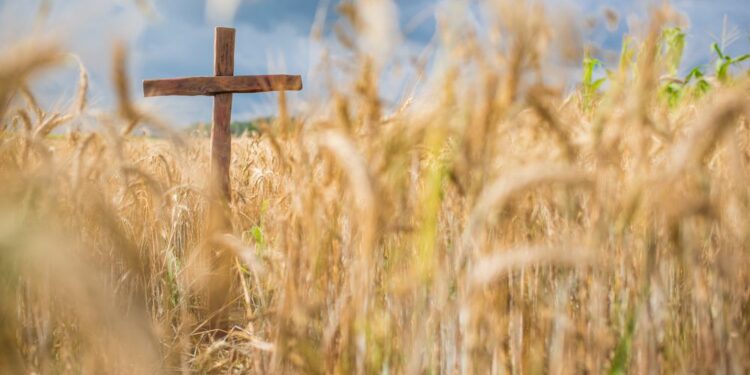A blind spot about rural life seems to have crept into the Catholic imagination that CRL can address, Thompson noted in his talk, “Another Way of Seeing,” where he presented a theological perspective on humanity’s relationship with the created world and challenged chapter leaders to emphasize care of creation and understanding of Church teaching. Many major universities no longer offer agriculture programs, and some seminarians Thompson co-teaches in a rural ministry practicum for St. Paul Seminary show little enthusiasm for rural issues.
“You can feel like you’re alone in a Catholic rural setting,” he said. “I want to express empathy to the challenge. CRL is there to provide the revelation, though, to lift up hearts and to renew our relationships there.”
Isolation and mental health issues are real problems in rural communities, and Kansas State University students, led by their campus chaplain, started the first student CRL chapter in 2021 on their agriculture-based Manhattan, Kansas, campus with one goal: to reach out to students from rural backgrounds.
“It’s been a big passion of mine, I guess, to kind of bring awareness to this and advocate for it, because I come from a line of very strong-willed farmers, and I see how hard it is for them to ask for help,” Jenna Reinert, a 21-year-old junior, told CNA.
Helping students connect and speak to the beauty of rural life were goals in starting the chapter, said Father Gale Hammerschmidt, pastor and chaplain at St. Isidore Catholic Student Center at Kansas State.
Mental health is an issue throughout rural America, he said, “and so we want to get started early with students on the collegiate level, recognizing that it’s not shameful to need help in regards to mental issues.”
The resources and connections Bishop Brendan Cahill finds with other bishops and farmers in rural dioceses across the country have helped him become informed about mental health and other issues affecting his mostly rural southern Texas Diocese of Victoria, which is 30% Catholic. In his nine years of involvement with CRL, he told CNA he’s seen the work of the organization as “an affirmation of our faith in rural America.”
“We talk about what we’re doing in dioceses, how we’re working with our churches, what we’re doing with our vocations, what we’re doing with our priests, issues, mental health, things like that that we’re dealing with.”
The opportunity to educate farmers in the two parishes he pastors in Iowa is why Kirigia is considering starting CRL chapters there. The two parishes, St. Patrick in Imogene and St. Mary in Red Oak, each have about 150 households and are 24 miles apart. Kirigia, who is originally from Kenya, attended a CRL retreat for priests and said he was struck to learn that century-old predictions for American farming are true now, including the industrialization of farming. He also noted that less farm production now is actually grown for people’s food, unlike in his native Kenya, where he estimated 95% of food is grown for human consumption.
There isn’t enough food in the world, he said, “but here we have an abundance, which is not really for food, right? While the rest of the world is starving because of lack of food.”
(Story continues below)
Subscribe to our daily newsletter
Caring for creation
Nolan of Williams College stated that foreign statesmen visiting rural America in the 19th and early-20th century saw a pervasive business approach to farming here, but the growth of the organic, slow-food movement and community-supported agriculture, whereby consumers buy local, seasonal food directly from a farmer, are making inroads.
Citing Pope Francis’ call for a more affectionate posture toward creation in his encyclical Laudato Si’, he said: “Thus, on this 100th anniversary of Catholic Rural Life, we have a wonderful opportunity, in a time when the land and farms and rural communities that have been harmed by practices and ways of thinking [related to industrial and technological mindsets of exploitation and extraction] that have persisted in American society for many years, [to] renew our commitment to thinking and acting differently.”
Iowa farmer Laughlin said he found hope in changing the industrial mindset of agriculture.
“You need a sense of purpose and creation and spirituality, I think, to actually comprehend maybe a better way,” he said. “At least all the information, most of the information I know of, coming to farmers is based off of a capitalist mindset so it’s hard to break away from that and come out with a kind of a spiritual sense, in my opinion.”
In working the land and being close to creation, farmers develop trust, patience, resilience, and faith in forces of the invisible to believe in mystery and miracles, Dolan said in his homily during the conference Mass.
Credit: Source link




